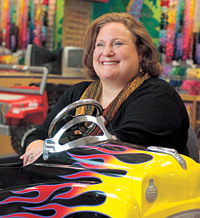| |
 |
| |
Jill
Gordon '80 |
| |
|
Hair
and CARE strike the right style
Salon
entrepreneur Jill Gordon '80 teams up with humanitarian organization
for social change in Peru
For
many Americans, the terrorist attacks of Sept. 11, 2001, left
an indelible mark and changed how they looked at the world.
Such was the case for Jill Gordon, a Kellogg School
entrepreneur who began seeking a deeper understanding of global
connections among nations.
She
says she realized how events on the other side of the planet
could have a real impact in her life. The attacks served as
a catalyst to get Gordon '80 involved in helping improve the
world — before problems like poverty and intolerance
led to a spiral of violence that too often met with more violence.
"My
philosophy is you can't win world peace by throwing more soldiers
at it. You have to be the good neighbor," she says. "You
can't defend every bridge and tunnel against terrorism. You
can't win by gunpoint. You've got to win the hearts and minds."
To
do so, a necessary first step seemed lifting people out of
desperate circumstances, and so Gordon, co-founder of the
KidSnips salon chain, began looking for partnership opportunities
with organizations that were already making a positive difference.
That's when she discovered CARE.
"Having
the Kellogg MBA mindset and thinking about efficiencies and
how to leverage resources helped me perform my philanthropic
due diligence," says Gordon, who examined many organizations
to identify the best performers.
Gordon
traveled to Peru last year with CARE, founded in 1945 to provide
relief to survivors of World War II. Today, the organization's mission is to serve the world's poorest
communities, according to the CARE Web site (care.org).
Joining hundreds of members, Gordon wanted to learn more about
the organization's effectiveness.
She
says she feels strongly aligned with the model that CARE provides
and now is among those lobbying Congress to highlight the
urgency for more U.S. involvement in supporting the efforts
of these organizations like CARE.
"CARE
comes into a community and trains indigenous people to address
issues affecting the economy of daily lives," says Gordon,
who traveled with the Chicago CARE Women's Initiative (similar
groups are found in cities across the United States). "CARE
is about teaching sustained values."
In
one situation, gold mining in Peru had left the region's water
sources polluted with mercury. The Peruvian government responded
by installing a filtration system that includes clay pipes,
a collection pool, filter screen and chemicals to absorb the
mercury and distribute the water. But this was only a temporary
fix that left residents high and dry, explains Gordon.
"The
problem was that within a couple of years, the clay pipes
would break down, and the government didn't maintain or repair
the system," she says.
By
increasing the ability of local communities to help themselves,
CARE created a co-op village water system to provide villagers
with a way to purify their own water. "Everyone pays
a nominal fee, CARE provides an engineer, and the Peruvian
government pays for a collection grid and purification chemicals,"
Gordon says. "It's effective and technologically simple."
CARE
is also shaping Peru's future through other endeavors. These
include creating strategic alliances among private enterprise
and impoverished artichoke producers; strengthening milk and
cheese production; and enabling families to generate income
by rearing cattle.
Back
in the U.S., Gordon's own entrepreneurial venture is doing
well. She continues to manage KidSnips, a salon that caters
to children under 10, offering DVDs, video games and toys
to entertain clientele while their hair is cut and styled.
Gordon and Kimberly Lee Stolze '80 founded the company in
1999. The pair recently opened their eighth store in the Chicago
area.
"We're
going strong, despite increased competition from national
chains and our biggest competition, a local franchise,"
says Gordon.
But
Gordon plans to act both locally and globally, continuing
her relationship with CARE, for which she is a member of the
Chicago charter. The Kellogg alum is planning a trip to India
with the organization in September.
|



